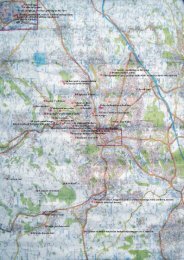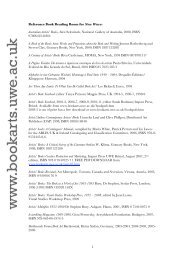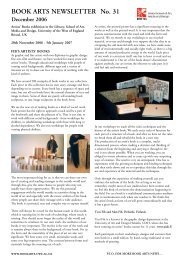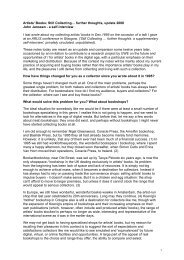Artist's Book Yearbook 2003-2005 - Book Arts - University of the ...
Artist's Book Yearbook 2003-2005 - Book Arts - University of the ...
Artist's Book Yearbook 2003-2005 - Book Arts - University of the ...
You also want an ePaper? Increase the reach of your titles
YUMPU automatically turns print PDFs into web optimized ePapers that Google loves.
<strong>the</strong>m, not hidden but veiled? Mull <strong>the</strong>m over,<br />
or read on? Having found one such page, do<br />
you search for o<strong>the</strong>rs or leave it until later?<br />
Are <strong>the</strong> words a commentary, an exegesis, a<br />
counterpoint?<br />
Read. For <strong>the</strong> story is thrilling -- in two<br />
paragraphs <strong>the</strong> young Jeronimo has attained<br />
<strong>the</strong> summit <strong>of</strong> his happiness (in Constantine's<br />
version), consummated his love (in Taylor's)<br />
and an elided nine months later, Josepha sinks<br />
down to <strong>the</strong> ground in labour. By <strong>the</strong> third<br />
paragraph she, rendered criminal, is on route<br />
to <strong>the</strong> scaffold. By <strong>the</strong> fourth, young ladies<br />
(Taylor) or pious daughters <strong>of</strong> <strong>the</strong> city<br />
(Constantine) hang out windows to view <strong>the</strong><br />
spectacle <strong>of</strong>fered to (Constantine) or mounted<br />
for (Taylor) divine vengeance. Then, just as<br />
Josepha is about to be beheaded (Constantine)<br />
or burnt at <strong>the</strong> stake (Taylor), and while<br />
Jeronimo is testing <strong>the</strong> knot on his self-made<br />
noose -- <strong>the</strong> earthquake.<br />
Having enjoyed <strong>the</strong> rubble, <strong>the</strong> screaming<br />
people on burning ro<strong>of</strong>tops, <strong>the</strong> men and<br />
animals struggling with <strong>the</strong> flood, we pass<br />
outside <strong>the</strong> city gate with Jeronimo. He faints,<br />
comes to, and a spirit <strong>of</strong> bliss takes hold <strong>of</strong> him<br />
as a west wind blows, and he looks down on <strong>the</strong><br />
loveliness <strong>of</strong> <strong>the</strong> land. Josepha in <strong>the</strong> meantime<br />
has seen a convent-full <strong>of</strong> nuns crushed, <strong>the</strong><br />
corpse <strong>of</strong> <strong>the</strong> archbishop, her fa<strong>the</strong>r's house<br />
submerged in a lake boiling with red vapour,<br />
and <strong>the</strong> destruction <strong>of</strong> <strong>the</strong> law court where her<br />
sentence was passed. She too has escaped <strong>the</strong><br />
city and has crept, baby in arms, into a dark<br />
valley shaded with pine trees.<br />
I can read no longer without thinking <strong>of</strong> <strong>the</strong><br />
time <strong>of</strong> <strong>the</strong> writing (probably 1806), and <strong>of</strong> <strong>the</strong><br />
writer, <strong>of</strong> Kleist (1777-1811). The hills, <strong>the</strong><br />
valley, <strong>the</strong> pines and <strong>the</strong> hordes <strong>of</strong> distressed<br />
people without number bring me back in time<br />
into <strong>the</strong> mental space <strong>of</strong> <strong>the</strong> last years <strong>of</strong> <strong>the</strong><br />
eighteenth, <strong>the</strong> first years <strong>of</strong> <strong>the</strong> nineteenth<br />
century. But whose time? Not only can I not<br />
propel myself back – well who could? -- but I do<br />
not even know German. Literally, I must read<br />
in translation. Constantine, properly, translates<br />
through Kleist’s older contemporary, Kant<br />
(1724 –1804) and o<strong>the</strong>r philosophers. Taylor<br />
through <strong>the</strong> philosophical poet Coleridge<br />
(1772-1836). And I – astigmatic, myopic and<br />
68<br />
presbyopic, read, at <strong>the</strong> beginning <strong>of</strong> <strong>the</strong> 21st<br />
century, through scratched plastic obsolescent<br />
National Health Service trifocals. A (largely<br />
second-hand) Freud and his followers when I<br />
read down, a vibrant unreachable indubitably<br />
post-modern far distance as I read up. Always a<br />
blur as I move through <strong>the</strong> middle. Would<br />
someone who knows more be helped or<br />
hindered by a greater background knowledge?<br />
All I can assert is that <strong>the</strong>re is a difference<br />
between<br />
“…and as though one fearful impression had<br />
driven all previous impressions from his<br />
[Jeronimo's] mind he wept for joy that life in<br />
its sweetness so full <strong>of</strong> bright phenomena was<br />
still his to delight in [Constantine]”<br />
and<br />
“as though that one terrible event had<br />
completely banished all earlier visions from<br />
his mind, he now wept for joy that he was still<br />
able to revel in <strong>the</strong> manifold delights that life<br />
had to <strong>of</strong>fer [Taylor]”.<br />
An impression or an event? Joy that life exists<br />
and that <strong>the</strong> bright phenomena are still <strong>the</strong>re<br />
for us to delight in? Or joy that one can still<br />
revel in <strong>the</strong> delights, ra<strong>the</strong>r than sink into<br />
dejection and melancholy? The passages<br />
nei<strong>the</strong>r evoke, nor mean <strong>the</strong> same thing.<br />
By now <strong>the</strong> rhetorical devices which shape <strong>the</strong><br />
story begin to reveal <strong>the</strong>mselves. Our reading<br />
post-dates <strong>the</strong> emergence <strong>of</strong> a critical<br />
vocabulary which accommodates such insights,<br />
and we can foresee that <strong>the</strong> story will fold back<br />
on itself, and that Josepha and Jeronimo, will,<br />
after <strong>the</strong> passage <strong>of</strong> a day <strong>of</strong> horror and a night<br />
full <strong>of</strong> wonder, meet <strong>the</strong> death to which <strong>the</strong>y<br />
were on route as <strong>the</strong> story opened. The desire<br />
<strong>of</strong> <strong>the</strong> story is to hold out or tantalise with <strong>the</strong><br />
threat <strong>of</strong> <strong>the</strong>ir deaths, postpone it with vivid or<br />
lyrical descriptions, and <strong>the</strong>n, in a shortish<br />
paragraph, bring about <strong>the</strong>ir deaths, and <strong>the</strong><br />
death <strong>of</strong> a baby – not <strong>of</strong> <strong>the</strong>ir baby, little Philip,<br />
but <strong>of</strong> little Juan. This doubling back, postponed<br />
through wandering and puffed with<br />
incident, is <strong>the</strong> space <strong>of</strong> <strong>the</strong> story. It would be<br />
tedious to tell you <strong>the</strong> plot.
















